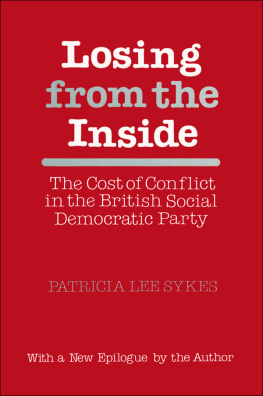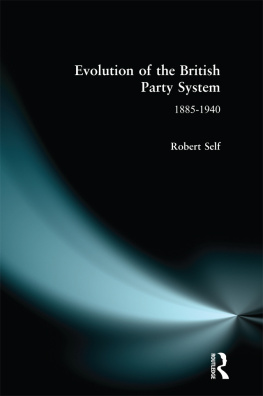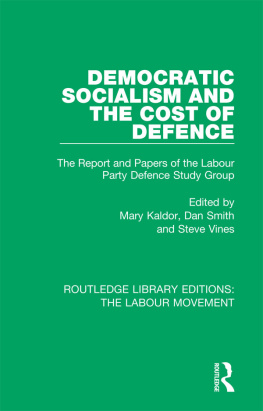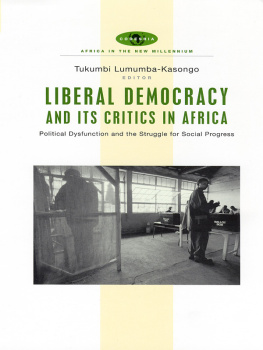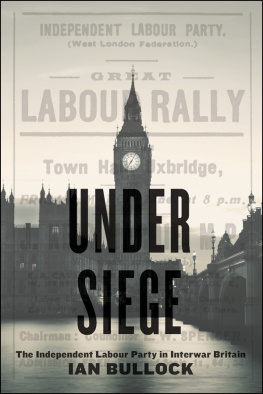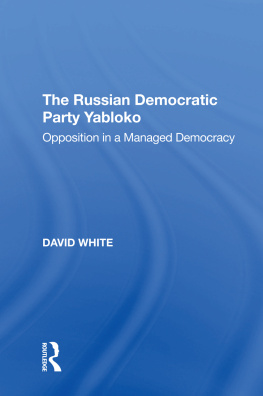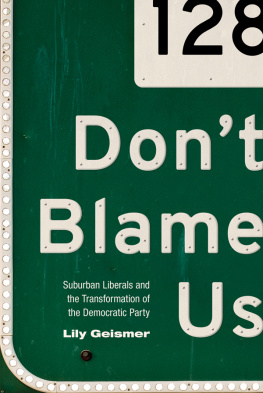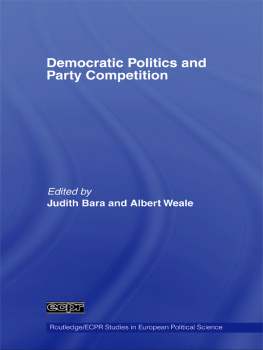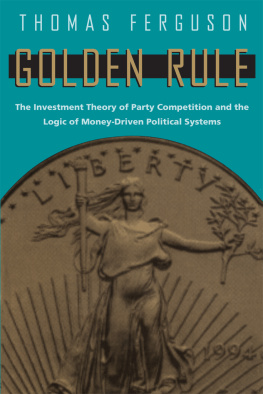First published 1988 by Transaction Publishers
First paperback edition, with new epilogue, 1990
Published 2017 by Routledge
2 Park Square, Milton Park, Abingdon, Oxon 0X14 4RN
711 Third Avenue, New York, NY 10017
Routledge is an imprint of the Taylor and Francis Group, an informa business
Copyright 1988 by Taylor & Francis.
New material this edition copyright 1990 by Taylor & Francis.
All rights reserved. No part of this book may be reprinted or reproduced or utilised in any form or by any electronic, mechanical, or other means, now known or hereafter invented, including photocopying and recording, or in any information storage or retrieval system, without permission in writing from the publishers.
Notice:
Product or corporate names may be trademarks or registered trademarks, and are used only for identification and explanation without intent to infringe
Library of Congress Catalog Number: 89-20322
Library of Congress Cataloging-in-Publication Data
Sykes, Patricia Lee.
Losing from the inside: the cost of conflict in the British Social Democratic Party / Patricia Lee Sykes: with a new epilogue by the author.
p. cm.
Includes bibliographical references.
ISBN 0-88738-815-9
1. Social Democratic Party (Great Britain). 2. Great BritainPolitics and government1979- I. Title.
JN1129.S58S95 1989
324.2410972-dc20
89-20322
CIP
ISBN 13: 978-0-88738-815-6 (pbk)
ISBN 13: 978-0-88738-223-9 (hbk)
In 1981 the British Social Democratic Party seemed new, different, young and fresh looking, as David Owen described it. For this reason, I began my study of the SDP by contrasting its organization, its aims, and its strategies to those of the older, traditional parties. Time and time again, however, the people I interviewed resisted my attempts to draw contrasts and instead made frequent comparisons. Unable to discover the new, I expressed my frustration to my father, who was sympathetic but, he declared, unable to help. Lets face it, he said, theres nothing new under the sun. Suddenly, I realized that my original outlook had obstructed my ability to see what was most significant about the SDP: it was a young political party, but it was not a new political party. Indeed, the SDPs failure to create a new party provides a lesson on the development of all parties, young and old.
A second stage in the evolution of my research followed the 1983 general election. After the election political scientists explained why the Conservatives won (it was the partys program, its strategy, the strength of its leader) or why Labour lost (it was the partys program, its strategy, the weakness of its leader). Meanwhile I was still trying to identify each partys program, strategy, and leader as presented to the electorate. Concerning defense policy, for example, voters could choose among various options: unilateral disarmament, multilateral disarmament, or no disarmament. And that was just the Labour Partys campaign. In contrast to the story told in most scholarly journals, my script included a larger cast of charactersHealey, Callaghan, Foot, Steel, Jenkins, Owen, Pym, and Thatcherand multiple plots. While reading the postmortem election analyses, I realized that I had observed an entirely different contest or, to be more accurate, a series of contests. In my mind, the most important aspect of the election had been neglected: why and how conflict within parties can shape the nature of competition among parties.
To examine the nature and consequences of intraparty conflict and at the same time tell the story of the SDP, I have tried to strike a balance between analysis and chronology in this book. focus on the consequences of internal conflict for electoral competition and demonstrate why the SDP, in alliance with the Liberals, lost from the inside during its two general election campaigns.
elections results, historical research, and other social science literaturesupplement the field research findings.
Throughout the process of research, writing, and revision, I relied on the assistance of many generous people, and I would like to acknowledge their substantial contributions to my work.
Only those who studied with Philip Williams can understand my gratitude and my sense of loss. When I met Philip at Oxford in 1981, his enthusiasm and concern for current affairs sparked my own interest in contemporary British politics. As his student, I came to appreciate not only his wit and his wisdom but also the personal qualities that made him a brilliant teacher and a special friend. I expect I shall always admire his talent for lively political discourse, respect his genuine love of politics, and miss his ability to render guidance when I needed it most.
As my faculty adviser at Yale, David Mayhew devoted a great deal of time and thoughtful consideration to my research. Throughout my graduate studies his astute criticisms provided constant intellectual challenge. Moreover, in the course of many lengthy conversations, his provocative questions and valuable suggestions enabled me to overcome those obstacles so often encountered in dissertation research. More important, David encouraged me to strike that essential balance between creativity and rigor.
In recent years several individuals have provided various kinds of assistance and encouragement. I am indebted to the following teachers and friends: Christopher Arterton, Harriet Bradley, David Butler, David Cameron, Michael Cohen, Cynthia Enloe, Peter Euben, Joseph LaPalombara, Gerald Pomper, Steven Rosenstone, Laura Scalia, Robert Scigliano, Len Scott, and Rosita Thomas. When Marsha Rabe suggested the title, she supplied the finishing touch to a project that owes much to her creative talent.
I am also grateful for the opportunities and resources provided by Nuffield College, Oxford and Yale University. At Yale, the Graduate School, the Concilium on International and Area Studies, and the Block Fund financed most of the dissertation research.
Clark University and the University of Massachusetts at Amherst provided the additional support I needed to complete this book. At UMass, I also benefited from the research efforts of an industrious undergraduate, Mary Ryan, and a gifted graduate student, David Smailes, whose resource-fulness and insight enriched this book in countless ways.
For information, I relied heavily on interviews with those who have been involved in recent British politics. I would like to thank the Gang of FourRoy Jenkins, David Owen, William Rodgers, and Shirley WilliamsSocial Democratic and Liberal MPs, party members, journalists, and consultants for their time and contributions to my research. I am especially grateful to William Rodgers for reading my entire dissertation, providing helpful suggestions, and adding many crucial insights to my own analysis.
Above all, I appreciate the support of my parents, John and Margaret Sykes, and the rest of my familyat home in the United States and at my home away from home in Bradford, England.
Notes
1. I conducted field research in Great Britain during the 1981-82 academic year, the general election campaign of 1983, the summer of 1984, and the general election campaign of 1987.
2. Richard Fenno, Home Style: House Members in Their Districts (Boston: Little, Brown, 1978), p. xiv.
3. In addition to national polling data, I use information from a survey of party activists in two British constituencies which I conducted with Gerald Pomper during the 1981-82 academic year at Nuffield College, Oxford. See Patricia L. Sykes and Gerald Pomper, Democracy in British and American Parties, in Gerald Pomper,

